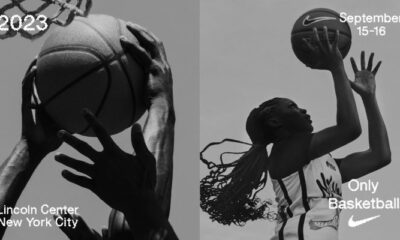Lifestyle
How Motion and Emotion Power Jordan Brand Basketball Design for the Next Generation

The approach to basketball footwear design at Jordan Brand is a lot like the image of Michael Jordan flying through the air during the ’85 dunk contest in a sleek pair of gold chains.
Michael Jordan’s motion made the game look beautiful. His attitude evoked an emotion that transcended basketball and broke barriers between sport and culture. The dichotomy of motion and emotion is at the core of how the Jordan Brand creates its performance basketball footwear — designing to benefit motion while creating an emotion both on and off the court.
“When we design shoes, we won’t stop at something just being a performance shoe because MJ himself always had a twist or a take on making the game his own,” says David Cin, Global Senior Design Director of Performance Footwear. “Sometimes when you’re trying to design something that’s a little different, the reason might not be superclear, but it’s something you feel. It’s not something you sit and wait around for. You create it.”
A New Signature Game Structure
With the introduction of Jayson Tatum’s signature shoe in February 2023, the Tatum 1, the Brand’s performance construct took its latest aim toward the future. In the past, the Team Jordan lineup followed the pinnacle game shoe, much like how the Jumpman Pro was the team model of the Air Jordan XII in 1997. Today, the framework lends itself to a fresh design approach based on the attributes and playing styles of its three latest signature athletes, organized by flight and speed: Tatum, Luka Dončić, and Zion Williamson.
At the top is the Air Jordan signature shoe. The Air Jordan XXXVIII is the pinnacle combination of flight and speed. The design process begins with a detailed analysis of the player’s style, studying the way they move down the floor, the way they jump, the way they dribble, their attitude and more.
“When we talk about motion, it comes down to true athlete insights,” says Jarrett Mann, Jordan Brand Global Product Director for Performance Footwear. “We watch tons of footage on players, dissect the tape and the footwork, and use specific motions that we’ve identified or noticed to create solutions for their game. When it comes to emotion, that comes down to identifying what is the soul or what is the narrative we want to tell around it.”
Such a detailed review of a player’s movement serves their game and, as a result, the broader customer base who’s inspired to play in it. For example, the signature line for Luka Dončić — who has an elite ability to decelerate and create separation — was created using that insight and by developing technology like the IsoPlate, which helps create space between him and his defenders. As players emulate Luka’s style of play, the Luka signature line creates a more responsive shoe for everyone who relates to that style.
A Team Effort
Jordan Brand boasts one of the industry’s most competitive footwear teams, and the team works collaboratively to balance the artistry of the athlete with the function needed to serve them.
“What’s unique about Jordan Brand is that the entire team — from design to color, materials, development and testing — are all so intertwined throughout the entire process that we’re able to effortlessly work together. We believe good ideas can come from anywhere,” says Kelsey Amy, Expert Color Designer of Performance Footwear.
The Air Jordan XXXVIII has a new design basis after the jumping-first design of the XXXIV, XXXV, and XXXVI. The Air Jordan XXXVIII was designed for the ground game, specifically inspired by the intricate footwork for Michael Jordan’s turnaround jumper. For Jacqueline Lefferts, an Expert Materials Designer of Performance Footwear, working shoulder to shoulder with many teammates across disciplines adds value in all directions. Just as Lefferts can suggest solutions for questions related to material composition, other teammates can help her understand whether a particular woven pattern will hold up structurally to the rigors of a full quarter, game or season.
One example came from creating the Air Jordan XXXVIII. The forefoot features a backless embroidery, which required a new manufacturing technique for the team in developing a basketball shoe. The geometry of the weave greatly changes how the material moves — which is important, because the forefoot zone needs to act like a seat belt, containing the player over the footbed. It took some tinkering before Lefferts and her team landed on a version that gave the right amount of lockdown.
“If the current version of the product isn’t cutting it, we have an amazing group of people with this collective experience,” says Lefferts. “If I don’t have the answer, I always feel confident a teammate will know what to do, and then we keep testing it until it works.”
The teamwork among the footwear creation team jump-starts fresh ways of making product too. In creating the Zion 3, the team wanted to create a new way to describe one of Zion Williamson’s important inspirational sayings, “Out of the Mud,” a phrase referencing his humble origin from Marion, South Carolina. Joël Greenspan, a Senior Footwear Designer with Jordan Brand, went to the computational design team, which included Adam Hiler, a Jordan Brand 3D Designer. Greenspan had a scan of Williamson’s foot and an image of kids jumping through the mud. Could they make something out of it? Not only was the 3D team able to create a custom pattern, but the pattern is engineered to withhold stress in high-wear areas on the upper.
“It’s exciting to create something that represents the athlete and is also strong, reductive and modern,” says Greenspan. “To make good on an idea that layered, it takes all of us.”
A Standard of Excellence That Inspires the Next Generation
While under the NIKE, Inc. umbrella, the Jordan Brand has a main figure of approval for the game shoe and other shoes in the signature family: Jordan himself. He sets the same high bar of excellence for review that he put toward his playing career.
Lefferts recalls one time when Jordan was reviewing the toe box of the Air Jordan XXXVIII. Jordan was adamant that the materials used on the upper would hurt a player’s forefoot based on its construction from the medial to the lateral side. When the product team dialed in the upper and tested the updated version of the shoe against the old one, everything that Jordan had said was right. The new version was more comfortable.
In Michael Jordan, the design team has both an inspiring leader and an expert in the room who can — and will — share his opinions on the product. The current roster is much the same way. Their expert insights help shape the future of the brand.
“Our athletes help take our product and innovation to a new place,” says Chad Troyer, Global Senior Product Line Manager of Performance Footwear. “Their feedback helps inspire the next generation to chase after their dreams and to think with no limits, just like MJ did.”
Source – Nike
-

 Auto2 years ago
Auto2 years agoHonda Marine Debuts All-New BF350 Outboard Company’s First V8 Motor Available Commercially, Flagship Model Offers Premium Power and Unparalleled Performance for Extraordinary Boating Experiences
-

 Auto2 years ago
Auto2 years agoNew Features Further Increase Desirability Of Bentayga Range
-

 Technology2 years ago
Technology2 years agoOracle Partners with TELMEX-Triara to Become the Only Hyperscaler with Two Cloud Regions in Mexico
-

 Auto2 years ago
Auto2 years agoHonda and Acura Electric Vehicles Will Have Access to Largest EV Charging Networks in North America Aided by New Agreements with EVgo and Electrify America
-

 Lifestyle2 years ago
Lifestyle2 years ago2023 Nike World Basketball Festival Brings the Best of Basketball Style, Culture and Community














